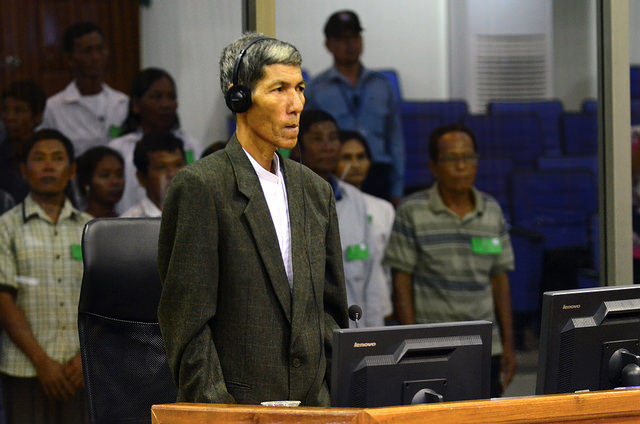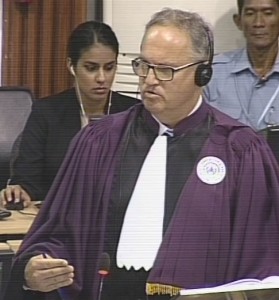“I Felt That I Was Like A Dead Person”; Third Witness On the Kampong Chhnang Airport Worksite
Today, in a half-day session, the Court starting hearing the testimony of witness Mr. Keo Loeur (កែវ លឿ). Mr. Loeur, 63, is the third witness in the segment of trial related to the Kampong Chhnang Airport Construction Site.
The crimes allegedly committed by the defendants at this worksite are detailed on this webpage of the ECCC.
The OCIJ interview of this witness from March 06, 2008 is available online, here.
Mr. Loeur was born on September 15 of 1951 in Roneam Village, Mean Chey Sub district, Sandan District, Kampong Thom Province. He said his current occupation was a rice farmer but his OCIJ interview lists his occupation as a Pagoda clergyman.
Mr. William Smith, Deputy Co-Prosecutor was given the floor first. Mr. Smith confirmed Mr. Loeur’s background details with the help of a 50-page DC-Cam interview.
Mr. Loeur confirmed to Mr. Smith that he joined Pol Pot’s revolution on the 18th of September of 1970 when he was (just) 18 years old. In his OCIJ interview he said that he was forced to join or they would have mistreated his parents.
In 1971, Mr. Loeur got Malaria and then returned to fight. He fought in the special zone around Phnom Penh, in Kampong Thom and then in the North Zone. On the 5th of December of 1974 he was promoted to Deputy Chairman of the Battalion.
Mr. Loeur said he was shot in the leg on January 1st of 1975 and spent 3 months in recovery. He was then sent to the unit for the handicapped, unit Ka 4, battalion 317, in Division 310.
“In Unit Ka 4,” Mr. Loeur explained: “there were about 600 people. . . some of them had their legs or arms broken and some of them were blind because of their injuries.”
Mr. Loeur confirmed that he was permanently handicapped and could not do any carrying work.
In 1976, Mr. Loeur was promoted to be company chairman of unit Ka 4. Then, because he was a cadre from the North Zone, he was arrested and taken to Khmuonh Kab Srauv. (In his OCIJ interview though he says that Unit Ka 4 was located in Khmuonh Kab Srauv –Mr. Smith did not point to this discrepancy in the hearing.)
In 1977, when there was a purge of the superiors of Division 310, Mr. Loeur confirmed that he was temporarily in charge of Unit Ka 4.
Mr. Loeur said he had been sent to Khmuonh Kab Srauv to be “tempered,” because he was accused of being an enemy.
Mr. Smith asked him if he was an enemy:
“I have no idea about this matter, Mr. Loeur responded. “I only knew that I was called for ‘tempering.’”
Mr. Loeur said that all the soldiers from regiment 317 were “tempered” at Khmuonh Kab Srauv. He said they woke up at 3 a.m. to work and only stopped at 10 p.m.
After 5 months of “tempering” there, he was sent to work at the Kampong Chhnang Airport Construction Site. Mr. Louer said he was sent there on the 15th of January of 1978. He was no longer the deputy commander when he arrived.
“All of us were considered combatants,” he said, “none of us were allowed to carry any weapons… the only thing that we had was an earth-carrying pole and an earth-carrying basket.”
Asked why he remembered the exact date, Mr. Loeur said: “this is one of the dates I cannot forget in my life.”
Mr. Loeur remained at the Kampong Chhnang Airport until the 7th of January of 1979, when the Vietnamese invaded, and he fled. He did spend 3 months out of that year training at Phnom Penh in land surveying.
The first two months at Kampong Chhnang Airport he spent pulling grass. He said he worked from 4 in the morning until 11 a.m. and then from 11:30 a.m. until 11 at night. He confirmed that they mostly all wore black clothing and that this was not considered a military uniform.
After Mr. Smith, the prosecutor confirmed that there was no hygiene, insufficient food and little sleep he asked Mr. Loeur to explain how that had felt:
“How did it feel, Mr. Smith asked, “to be puling grass with a broken leg, with insufficient food, lack of sleep and no hygiene facilities. How did it feel? Describe that to the court, please,” he prompted.
“Allow me inform the court,” Mr. Loeur started “that I felt that I was like a dead person, I never thought I would survive. I thought that I would die from overwork and exhaustion and that I would go and meet my parents. I lost contact with them. I wept at night. I was hopeless because of the working conditions on site. “
After two months, he was sent to Phnom Penh to learn how to measure and survey land. He was second in his class there. (His OCIJ interview mentions that he saw Khieu Samphan, Ieng Sary, Nuon Chea and Ke Pauk at the Olympic Stadium when they held 20,000 people meetings and later recognized some of them when they visited the airport—a point that perhaps the prosecution or the civil-party lawyers will ask about on Monday).
After he returned from his training in Phnom Penh to the airport, Mr. Loeur said that the work was lighter. But, he still couldn’t leave if he wanted, he couldn’t refuse the work, had no wages and no holidays.
“We worked every single day of the month,” Mr. Loeur said.
“If you wanted to sleep in that day, could you do that?” Mr. Smith prompted.
“Of course not!” Mr. Loeur responded. “As I told you, if we did not go work we would be accused of being enemies.”
Mr. Smith asked the witness Mr. Loeur to explain what he had meant when he said in his OCIJ statement that people died from overwork at the Kampong Chhnang Airport.
“I would like to inform the chamber,” Mr. Loeur responded, “that some people who were carrying earth and who were digging the earth fell and became unconscious and many of them died because of their work and because of the fact they were too fatigued…. if a worker died there would be no ritual ceremony, the dead body would simply be buried.”
After Mr. Loeur said that he did not see many arrests at the Kampong Chhnang Airport, Mr. Smith asked him questions about arrests at Khmuonh Kab Srauv. Mr. Loeur confirmed that arrests were very common there: “4 to 10 persons” every night, he said.
The prosecution did not clarify why the arrests at Khmuonh Kab Srauv were relevant to the Kampong Chhnang Airport Worksite.
Mr. Loeur, did say that he was aware that Toul Sleng was a prison at that time. He said he was aware of this because cadres threatened that anyone who was lazy would be sent to the Toul Sleng prison.
Mr. Smith then asked: “Arrests were happening every night. How did you feel being in that atmosphere? Can you explain to us what it would have been like?”
“We had no feeling in ourselves,” Mr. Loeur responded, “and we were afraid for our lives. We could see the arrests.. I was terrified, so terrified and worried at that time.”
Mr. Smith attempted to highlight a name from the Tuol Sleng prison lists on the screen to see, presumably, if Mr. Loeur would recognize it.
There was a technical glitch, though, and the clock was ticking close to 4 p.m.. The President, “because it’s Friday,” as he said, adjourned until Monday the 15th at 9 a.m. when the Court will continue hearing this witness.


